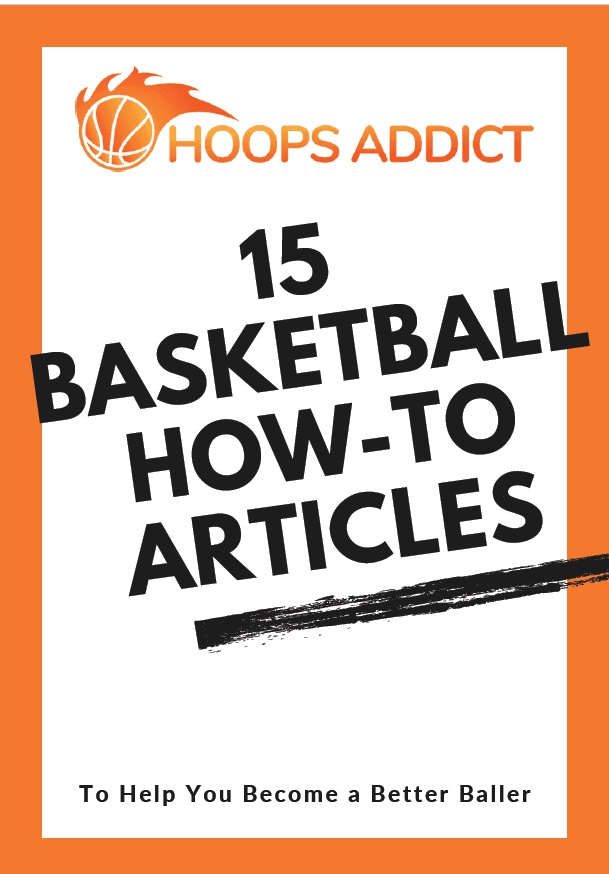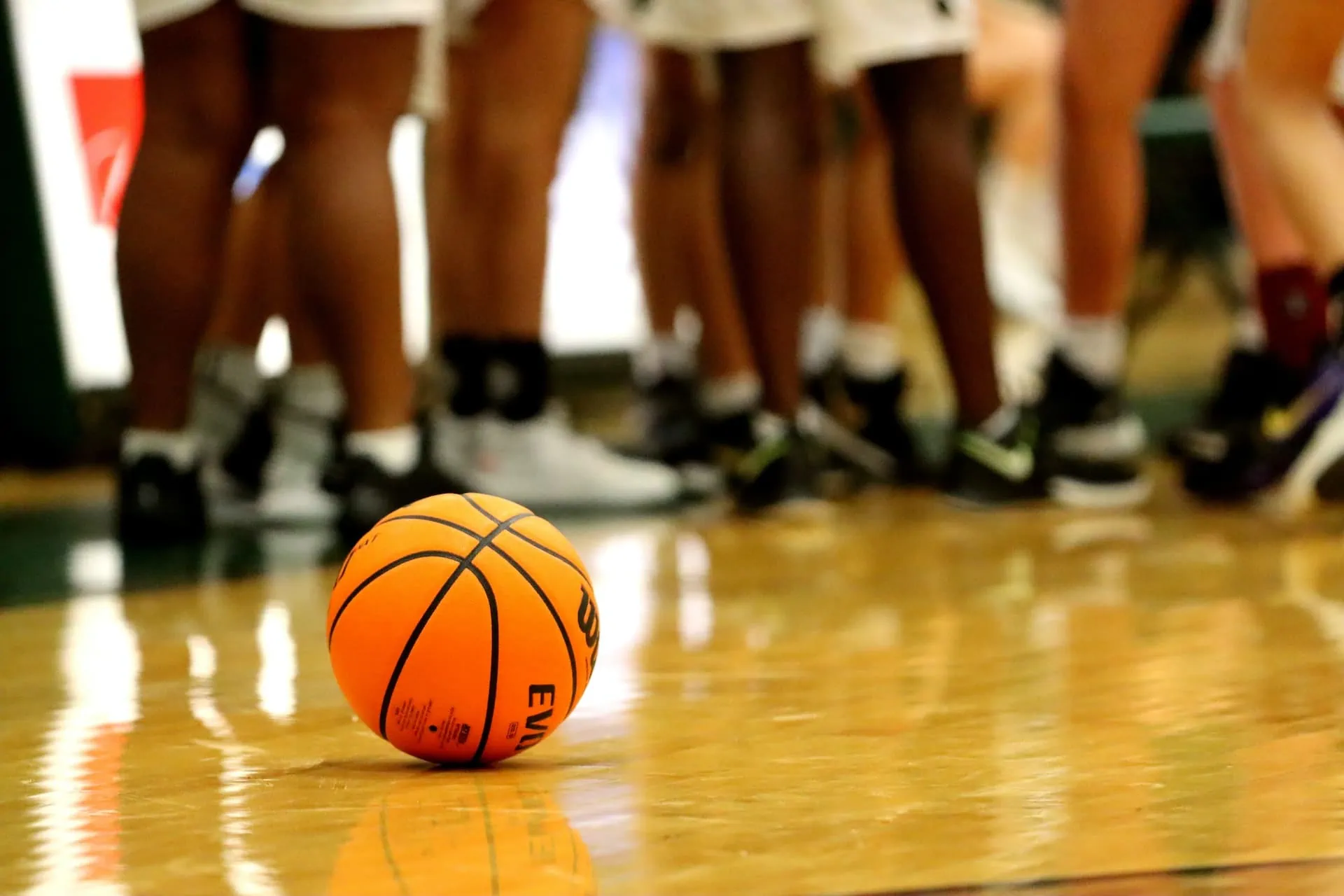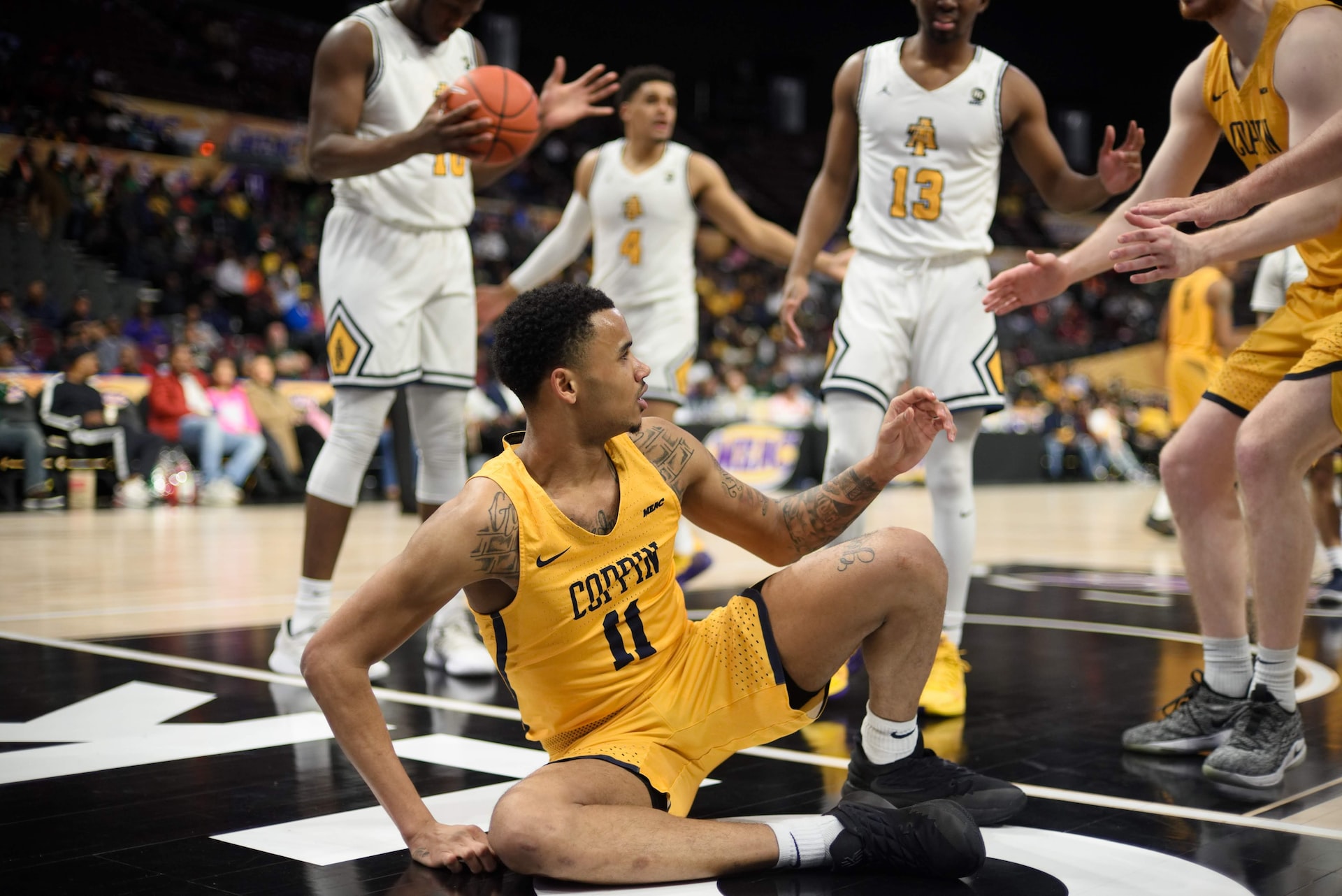If you are new to this sport, substitution in basketball occurs when you are replaced with another during a game if tired or injured. The NBA tactically substitutes players to change the team strategy or be at par with the opposition.
Now, how many substitutions are allowed in the NBA? Substitutions are permitted anytime during a game, and each team can do so without limitations.
Since you are dying to know what else you should learn about NBA substitution rules, check out the rest of the article to gain more knowledge about it and be prepared for your next game.
 Why Do Substitutions Happen in Basketball?
Why Do Substitutions Happen in Basketball?
In basketball, each team can strategize twelve active players and up to three inactive players on their game roster. These players are key drivers in the NBA substitution patterns who will take over the position of any of the five players on the court if situations call for it.
During a game, each team can make up substitutions to gain an advantage in the match to make better lineups against the opposition. However, NBA substitution rules and restrictions govern the legal timing and approach that your coach can make.
Simply put, there are several strong motives why substitutions happen in basketball; think of it as a strategy to win a match. It is not just a matter of giving other players on the bench opportunities to play a game, but it depends on who can ideally play during a given basketball scenario.
- To rest an exhausted or injured player
In other words, substitutions in basketball serve many purposes, including resting a player when overworked and unable to keep track of the opposing players. Your coach may charge you with substitution if you are exhausted or injured from the match and let your teammate take your place.
- For matchup strategies
Some players are better guards for the opposing team, making them perfect to be part of the playing roster. Moreover, the NBA substitutes players to create an ideal matchup with the other side of the bench in tactics and game strategy. When matchups are fitting, the game becomes more exciting and engaging.
- When a player is charged with a foul suspension
On the other note, substitutions are rather technical and are mandated by basketball rules. NBA may substitute players when a player is charged with foul troubles because it is sanctioned for ejection. Hence, your teammate from the bench will replace you if you ever make constant technical fouls.
Ideally, it is vital to understand the NBA substitution rules to get acquainted with basketball standards and apply them to your tournament games. In this case, you are expected to end the game with a clean and fair record. It also prevents you from earning penalties, especially if you are an aspiring coach.
 Is There a Substitution Limit in the NBA?
Is There a Substitution Limit in the NBA?
If you are still a newbie in this sport, you might think of the substitution limit during a game. Before anything else, it is essential to understand that the whole trajectory of a game is not solely reliant on substitution limits. It is the holistic strategy that makes up your team’s edge.
The short answer to the question about substitution is that NBA basketball substitutions are not limited as long as they are anchored in the stated game rules. Your coach can freely utilize this privilege when the accepted standards ground it in basketball.
As stipulated on the official NBA website, substitution is granted to a player should the situation call for it, like foul suspension, injury, and other accepted reasons. Nonetheless, it does not tolerate any interruption to an ongoing match, which means that your coach will be given penalties in an attempt to intercept a game.
Your coach is allowed to replace a player during a dead ball or when the game is not currently proceeding. If you substitute a player, you must inform the scorer whom you are about to succeed and stay within the 8′ Substitution Box—in front of the scorer’s table.
Remember, substitution might be unlimited, but your coach must abide by the fair and just basketball regulations. In a basic sense, there are no limitations to the amount of substitution, but there is a directive on when you can call for it.
 What are the Substitution Rules in Basketball?
What are the Substitution Rules in Basketball?
Similar to any other sport, basketball committees impose standards that all players, coaches, and officials should follow. Although substitutions are unlimited, there are standard operating procedures to consider as a coach, a player, and a basketball official.
The logic behind this narrative is to create a just play without disrupting a game that may potentially put a team on a disadvantageous end. This section will comprehensively look at the rules governing substitutions in the NBA, so keep reading to understand how these rules are used in practice.
How Many Substitutions are Each Team Allowed to Make?
Based on the regulations stipulated by the NBA guidelines, there are no technical restrictions on the number of substitutions a team can make. Since there are 12 players on the roster, five of which are designated on the court, the seven await on the bench for substitution calls.
Remember, these substitution privileges are significant factors in winning a game when utilized wisely. Therefore, your coach makes a deliberate decision on who and when to replace a player, even though it is unlimited.
An excellent team strategy relies on the quality and ideal players to enter a court. When you are positioned for a substitute, make sure to live up to your role to maximize the substitution benefit awarded to your team.
How Many Substitutions are Allowed in Basketball per Quarter?
Although a basketball substitution is technically unlimited, there are ideals that basketball should follow to ensure quality performance and rules abidance.
The best answer to the question is a maximum of five substitutions allowed per team in every team to avoid the game from being messy. It is also a rare occasion for basketball teams to exhaust all the five allowed marks and go beyond the limit since neither the offensive nor defensive team does not want a match full of breaks.
Substitutions usually happen during a legal time-stop in a game or at half-time intervals. It violates the rules when you request a substitution while the game is ongoing. You must follow the proper substitution flow you will encounter in the following section of this article.
How Many Times Can a Player Be Substituted in Basketball?
Perhaps you are confused about the NBA substitution rules and regulations, especially concerning the number of times a player can be substituted. There are no detailed qualifications for how many times you can be sanctioned with substitution calls.
Even if you enter a court for several points of time, you are still credited as long as you follow the standard procedure in entering a court. No matter the numerical counts, you can still be allowed to be a part of the five players on the court.
However, it is rare for coaches to let a single player take over the entire four quarters of a single match because strategy, physical strength, and mental soundness are top priorities they take into account. Hence, bench players are just awaiting to replace a position should situations like injury, physical exhaustion, and strategic move arise.
 When Can a Substitution Be Made in Basketball?
When Can a Substitution Be Made in Basketball?
Taking substitutions in basketball as both technical and strategic moves is necessary. When your coach calls for a substitution, it is not just based upon a decision from out of the blue. You will extensively understand in the bulleted points below various reasons why substitution is made in basketball at the right time.
- When a personal or technical foul is awarded
When your teammate on the court is given a consistent foul suspension that prohibits him from stepping into the court during the whole match, the game is put on hold, and the timer is paused. Therefore, you can make substitution grants with the permission of your coach.
The standard procedure of calling for substitution is to inform the scorer whom you will replace before a dead ball. Unless a technical or personal foul is called, that does not need prior notice since only four players remain, so your team needs one player to keep the game going.
- During an alternating possession
Since there is a change of ball possession, it means dead ball because a player is restarting the play due to a basket shoot. Your coach may call for a substitution, especially if a player consistently makes loopholes and is seemingly exhausted.
Also, alternating possession chances are an excellent time for substitutions if a new player from the opponent has also replaced one of their five athletes on the court. In this case, you must inform the scorer and stand in the 8′ Substitution Box in front of the scoring table.
- When a timeout is given
The game is currently on hold when a team gets a timeout. Hence, it is an excellent opportunity to switch players and make the lineup stronger and more capable of winning against the other side of the bench.
Again, you cannot go to the court without prior notice to the scorer because it violates basketball rules. The scorer will first check the records, like your fouls and whether you are allowed to replace a player.
- In basketball injury
Safety administration is a no-brainer since it is the topmost priority of any sports endeavor. A team comprises twelve active players, and only five of them can play on the court at the same time. Hence, one of the seven players can take over when an injury occurs to complete the lineup.
A game cannot continue with an incomplete roster on the court, so an injured player is automatically replaced by anyone of you on the bench. Therefore, bench players need to be alert since you will be called for a substitute anytime without prior notice.
 What is an Illegal Substitution in Basketball?
What is an Illegal Substitution in Basketball?
By definition, grounding illegal substitution in basketball is entering the court when the ball is live without prior notice to the scorer or when you beckon to the play without being recognized by any officials. It is an act of defiance of the regulations stipulated in the NBA guideline, which can also be found on their website.
You are granted a technical foul when you illegally enter a court (not reporting, not being beckoned, or both). In addition, a ball becomes live through jump ball, in-bound pass, and free throw. Once the ball is live after a dead ball and recognized by an official, you are considered a legal player.
In layman’s terms, illegal substitutions in basketball happen in the event of interrupting a live ball or breaking off the substitution rules. You must always abide by the standards to ensure legal entrance to the court, thus preventing you from getting technical fouls that lead to suspension for the whole game.
Wrapping Things Up: How Many Substitutions are Allowed in NBA?
Basketball is such a complex sport that it may confuse rookie players since there are mandatory rules to follow to ensure fair play—most of them often wonder how many substitutions are allowed in the NBA.
The short answer is substitution in basketball is unlimited, but it must be mechanized strategically because it will make or break a game’s momentum. Although it is absolute, some professional matches only credit up to five substitution calls per team in every quarter. Also, it is based upon case-to-case scenarios, so you must necessarily understand the exemptions, time, and number guidelines.
Whether you are a part of the first five or a bench player, you need to understand the substitution rules thoroughly because it prevents you from gaining technical fouls, likely leading you to suspension or ejection from an ongoing match.
It may seem overwhelming initially, but you will surely pick up these rules in the long run. Everything is just a matter of mental conditioning and practice, as nothing is impossible!
We hope you enjoyed this post! If you did, be sure to check out our other basketball FAQ articles here.
Want to get better at basketball?
Join our newsletter & get our comprehensive
101-page basketball guide.
Become a better baller today 👇


 Why Do Substitutions Happen in Basketball?
Why Do Substitutions Happen in Basketball?
 Is There a Substitution Limit in the NBA?
Is There a Substitution Limit in the NBA?
 What are the Substitution Rules in Basketball?
What are the Substitution Rules in Basketball?
 When Can a Substitution Be Made in Basketball?
When Can a Substitution Be Made in Basketball?
 What is an Illegal Substitution in Basketball?
What is an Illegal Substitution in Basketball?

